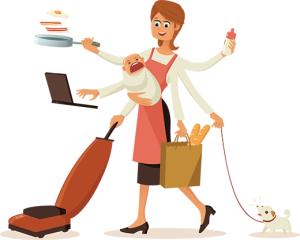How Sitting Cooped Up at Home Can Affect Housewives’ Mental Well-Being

By virtue of the nature of certain positions and activities, there can be a predisposition towards suffering depression and other mental health issues. One among these, is being stay-at-home housewives. This is not to mean that all stay-at-home housewives are depressed or are doomed to depression, but rather that it is more likely, especially if there is prolonged isolation or a state of stressed overwhelm due to the work load.
PC: www.theconversation.com
As it stands, stay-at-home housewives are involved in the rigorous demands of keeping a house. The chores begin with waking up on time to cook for the family, and then to clean up after everyone makes a move to attend to their own days and needs. They keep house, and oftentimes, remain alone for long hours – sometimes without any company, keeping to themselves, and sometimes, even left to their own defences to handle the many demands of a daily living. According to the National Institute of Mental Health, USA, globally, housewives are more prone to developing depression and mental health issues if they spend long hours alone and cooped up in the house.
PC:www.candysdailydandy.blogspot.com
In many situations, since housewives keep house and take care of the family, there is often a situation where these women tend to lose sight of their identities – the constant placement of others before the self tends to push these women into a state of oblivion and self-neglect, which can also function as among the more major causes for depression in housewives.
Signs and Symptoms
Depression in housewives can easily be gleaned from their behaviour. The following are some symptoms of depression in such situations:
- A sense of detachment and aloofness from everyone
- Inability to socially acclimatize
- Withdrawing and feeling suicidal
- Inability to perform daily routine activities such as cooking and cleaning or even running errands.
- In some instances, this can be aggravated or augmented by post-partum depression and isolation.

PC:www.thestar.com
Seeking Help
One of the biggest issues that challenge housewives who cope with depression is the fact that they seldom have anyone to talk to. It is often easy for them to be forgotten or neglected by their family members, perhaps out of the mistaken belief that they are safe and fine within their homes – when the truth is that they probably feel confined and isolated. There is also a tendency to shy away from speaking out because of the imposition and ascription of a stigma – in a social set up where the role of a housewife is often seen as significantly pivoting towards being docile and subservient, there is less room for women to speak out, or even seek to speak out and seek help.
Article courtesy: Seekspark
Feature image courtesy: www.thestar.com


